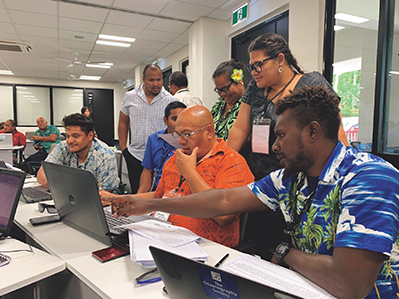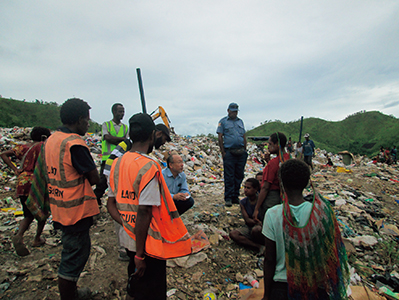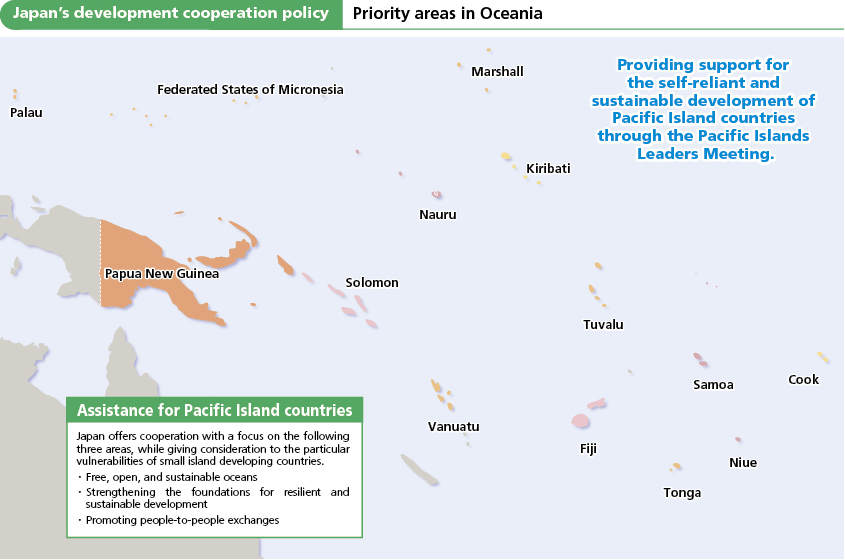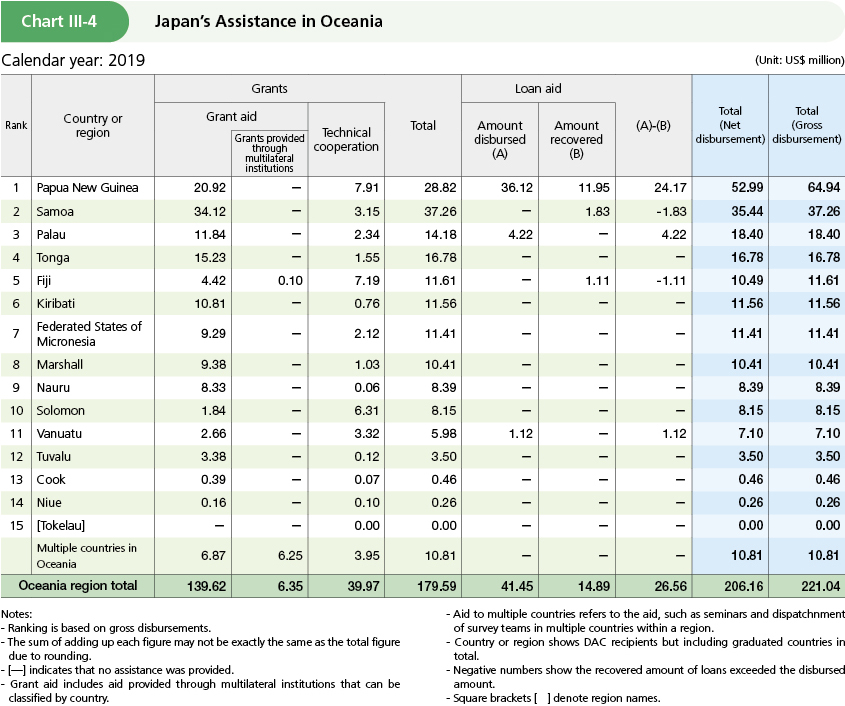3. Oceania
The Pacific Island countries are not only Japan’s “neighbors” bound by the Pacific Ocean, but also share deep historical ties with Japan. Also, in possessing vast Exclusive Economic Zones (EEZ, maritime zones where a sovereign nation has certain economic rights), these countries are key to maritime transport activity and provide essential fishing grounds for bonito and tuna fisheries. As a result, the stability and prosperity of Pacific Island countries are very important to Japan.
Meanwhile, many Pacific Island countries are relatively new independent states with the urgent task of becoming economically independent. In addition, they face common challenges particular to small island countries, such as small-scale economies dependent on primary industry, territories geographically scattered over the vast area of the sea, difficulty in accessing international markets, and vulnerability to natural hazards. Based on this situation, as a good partner with Pacific Island countries, Japan provides assistance to support their self-reliant and sustainable development.
●Japan’s Efforts
In order for Pacific Island countries to achieve political stability and self-reliant economic development, it is crucial not only to support each country in overcoming their socio-economic vulnerabilities, but also to provide comprehensive assistance for the region. In addition to promoting cooperation with the Pacific Islands Forum (PIF) Note 7, a framework for regional cooperation composed of Pacific Island countries, Japan has hosted the Pacific Islands Leaders Meeting (PALM), a summit meeting between Japan and Pacific Island countries every three years since 1997. Furthermore, the PALM Ministerial Interim Meeting has been held approximately 18 months after each PALM since 2010.
In May 2018, the Eighth Pacific Islands Leaders Meeting (PALM8) was held in Iwaki City, Fukushima Prefecture. With the pillars of “(i) free, open, and sustainable oceans; (ii) strengthening the basis for resilient and sustainable development; and (iii) Connecting Pacific Citizens” and based on the achievements so far, Japan announced plans to continue the steady implementation of development assistance as before, as well as further strengthen human resource development and exchanges (over 5,000 people in three years), which are the foundation for growth and prosperity.
In May 2019, the Interagency Committee for the Promotion of Cooperation with Pacific Island Countries determined the basic policy of reinforcing and concentrating resources for Pacific Island countries and strengthening initiatives with all-Japan efforts. Based on the basic policy, Japan implements bilateral cooperation, including the development of basic infrastructure such as ports and airports, as well as technical cooperation targeting multiple Pacific Island countries.
Under the first pillar of PALM8, “free, open, and sustainable oceans,” Japan conducted training on the prevention of illegal, unreported, and unregulated (IUU) fishing for officials from Pacific Island countries. Under the second pillar of “strengthening the basis for resilient and sustainable development,” Japan provides comprehensive assistance through “mainstreaming disaster risk reduction,” which includes training meteorological agency personnel and developing rapid evacuation systems, as well as strengthening human resources and systems related to waste management. For example, as part of the “MARINE Initiative” (see Conservation of the Marine Environment for details) launched by Japan in order to achieve the “Osaka Blue Ocean Vision” shared at the G20 Osaka Summit, Japan provides support for strengthening human resources development as well as organizational and systematic foundations for sustainable waste management in the Oceania region. Through this Initiative, training was provided for approximately 300 people in FY2019, with indirect benefits reaching approximately 50,000 people. Furthermore, to support Pacific Island countries’ efforts addressing climate change, Japan has collaborated with the Secretariat of the Pacific Regional Environment Programme (SPREP), a regional international organization based in Samoa, in fostering human resources engaged in formulating countermeasures against climate change. Finally, under the third pillar of “Connecting Pacific Citizens,” Japan provides support for master’s education programs in Japanese graduate institutions and implements internship programs in Japanese ministries and agencies for young government officials.
Furthermore, in response to the global spread of COVID-19, Japan has provided health and medical equipment worth approximately ¥4 billion in total and technical cooperation for 14 countries in the Oceania region in 2020. Additionally, Japan has decided to provide a total of ¥42.5 billion in financial assistance loans for Papua New Guinea, Fiji, and Solomon to support economic recovery.
Japan will continue to support Pacific Island countries in strengthening health care systems and recovering the economies impacted by COVID-19 in collaboration with the United States, Australia, New Zealand, and other partners. Through such efforts, Japan will work hand in hand with them in building a stable, resilient, and prosperous Oceania region in the post-COVID-19 era.

Training under the ongoing technical cooperation “Project for Capacity Building on Climate Resilience in the Pacific” in Samoa (Photo: JICA)

Activities at a waste disposal site in Papua New Guinea as part of the Project for the Promotion of Regional Initiative on Solid Waste Management in Pacific Island Countries (Photo: JICA)


- Note 7: The 16 PIF member countries and two member regions are Australia, New Zealand, Papua New Guinea, Fiji, Samoa, Solomon, Vanuatu, Tonga, Nauru, Kiribati, Tuvalu, Federated States of Micronesia, Marshall, Palau, Cook, Niue, French Polynesia, and New Caledonia.
